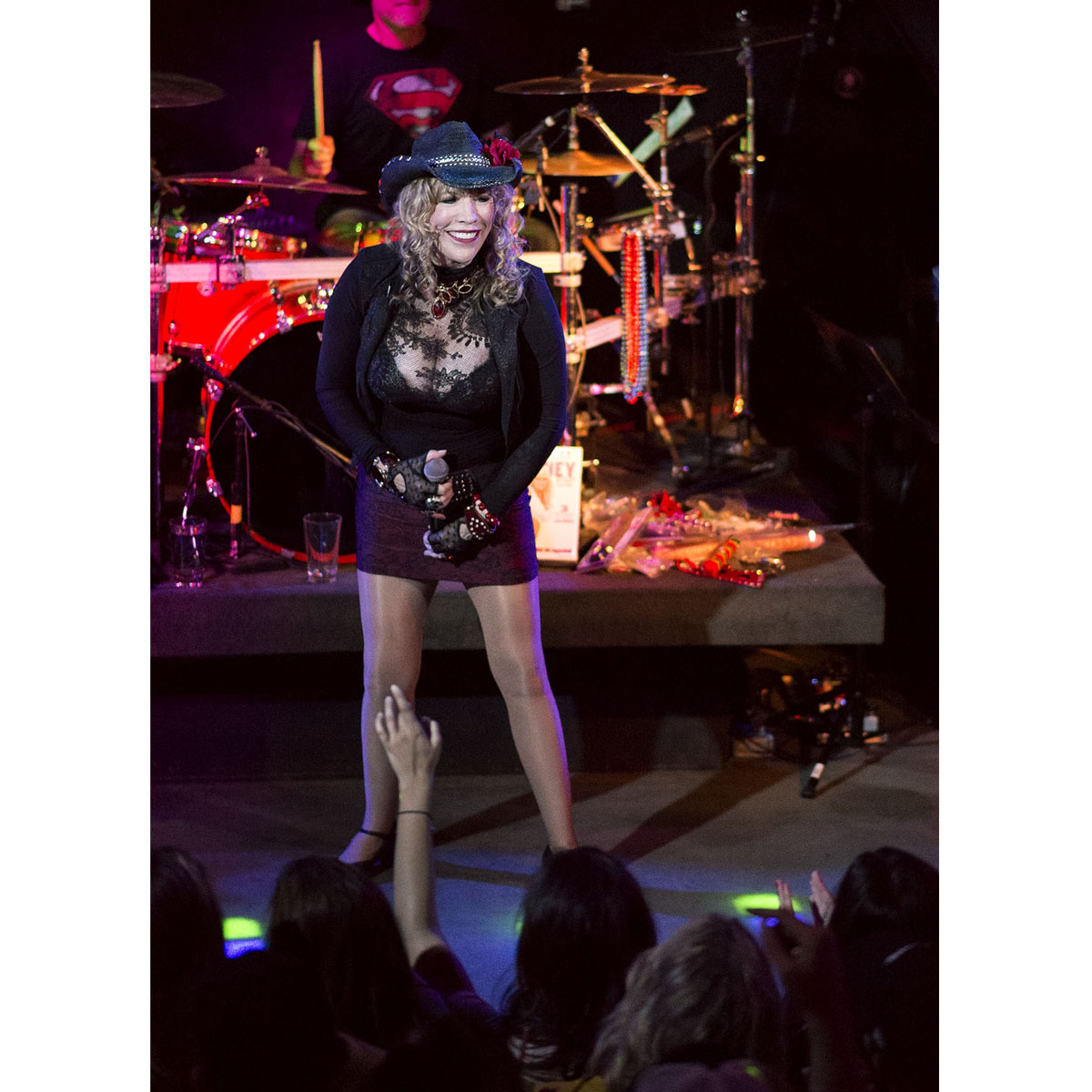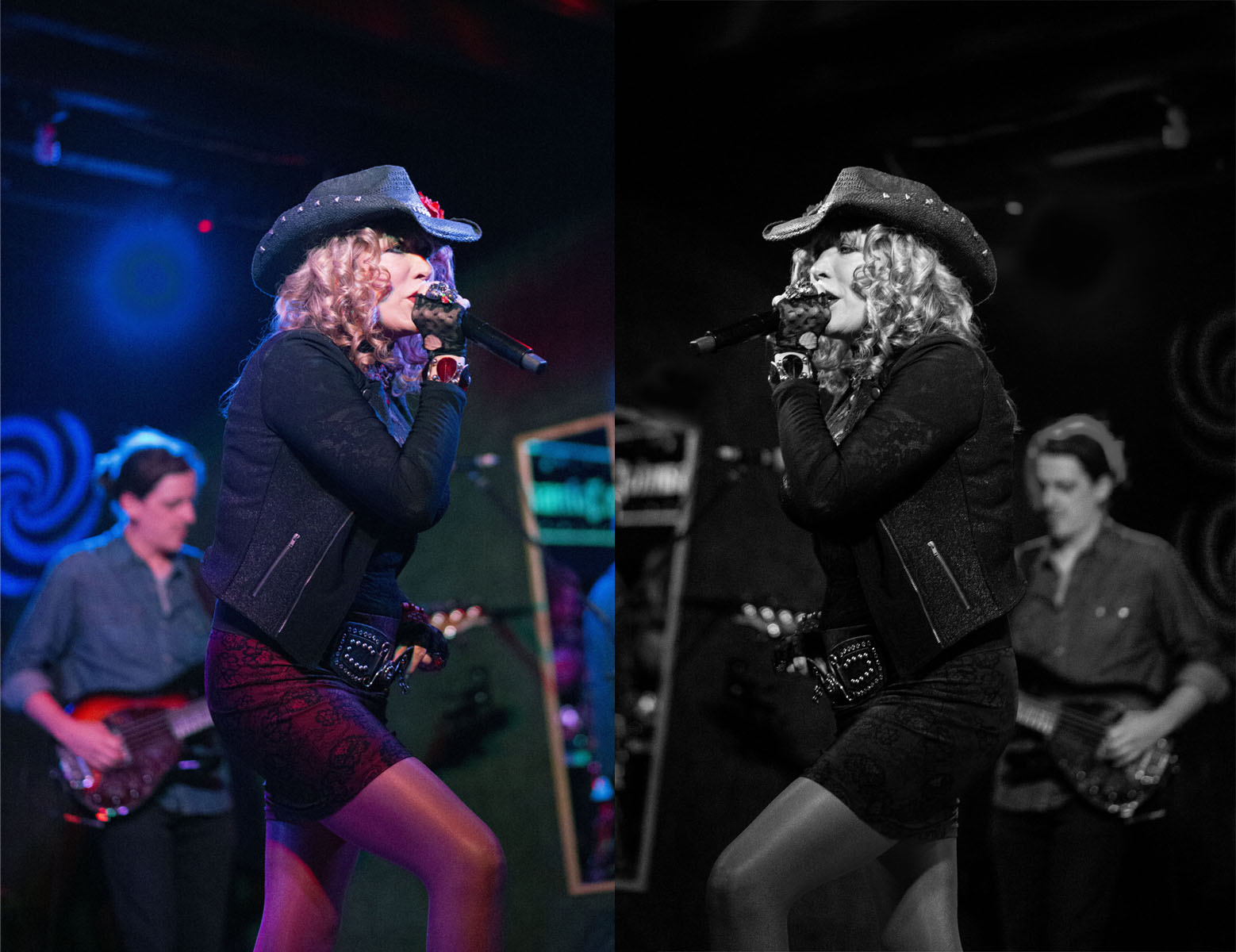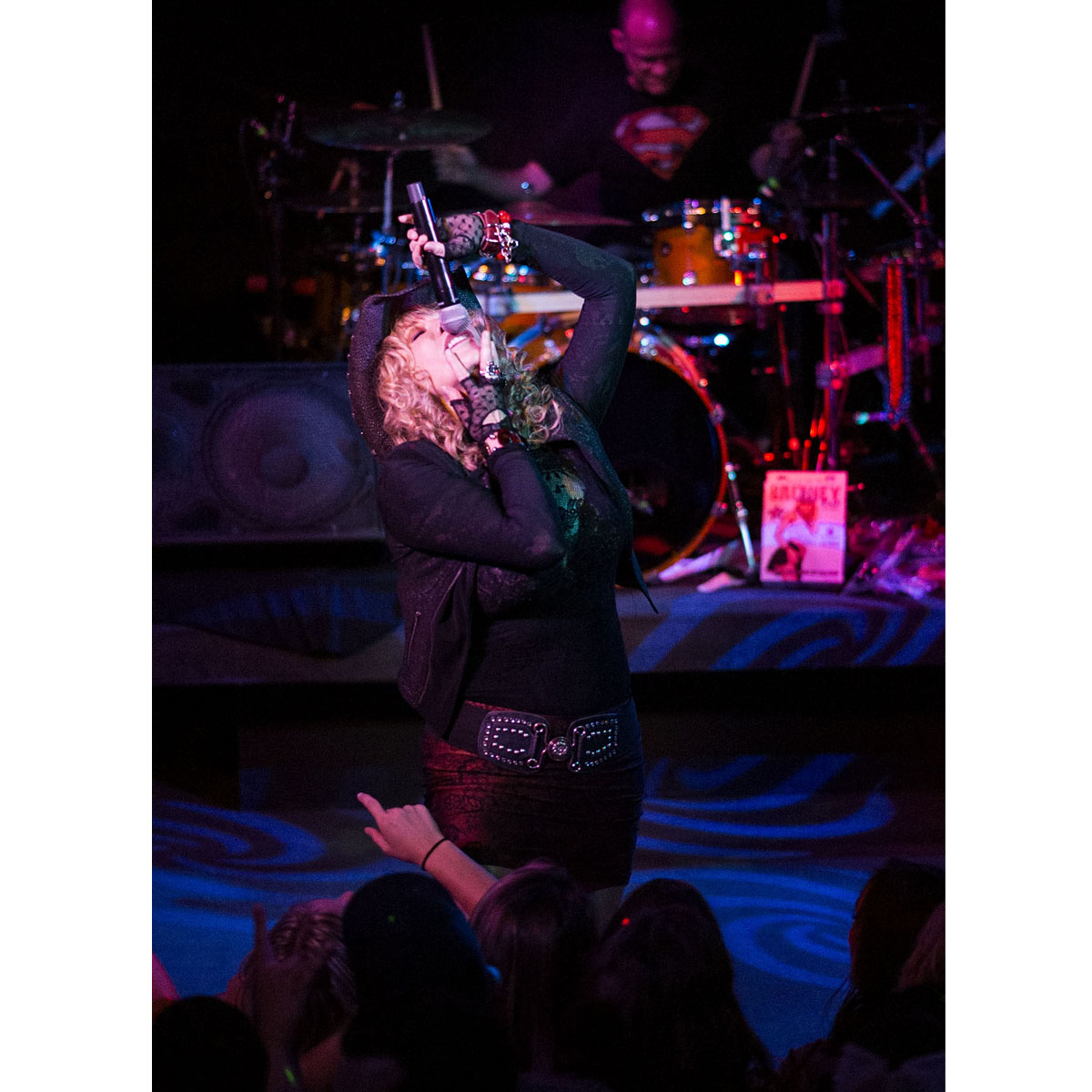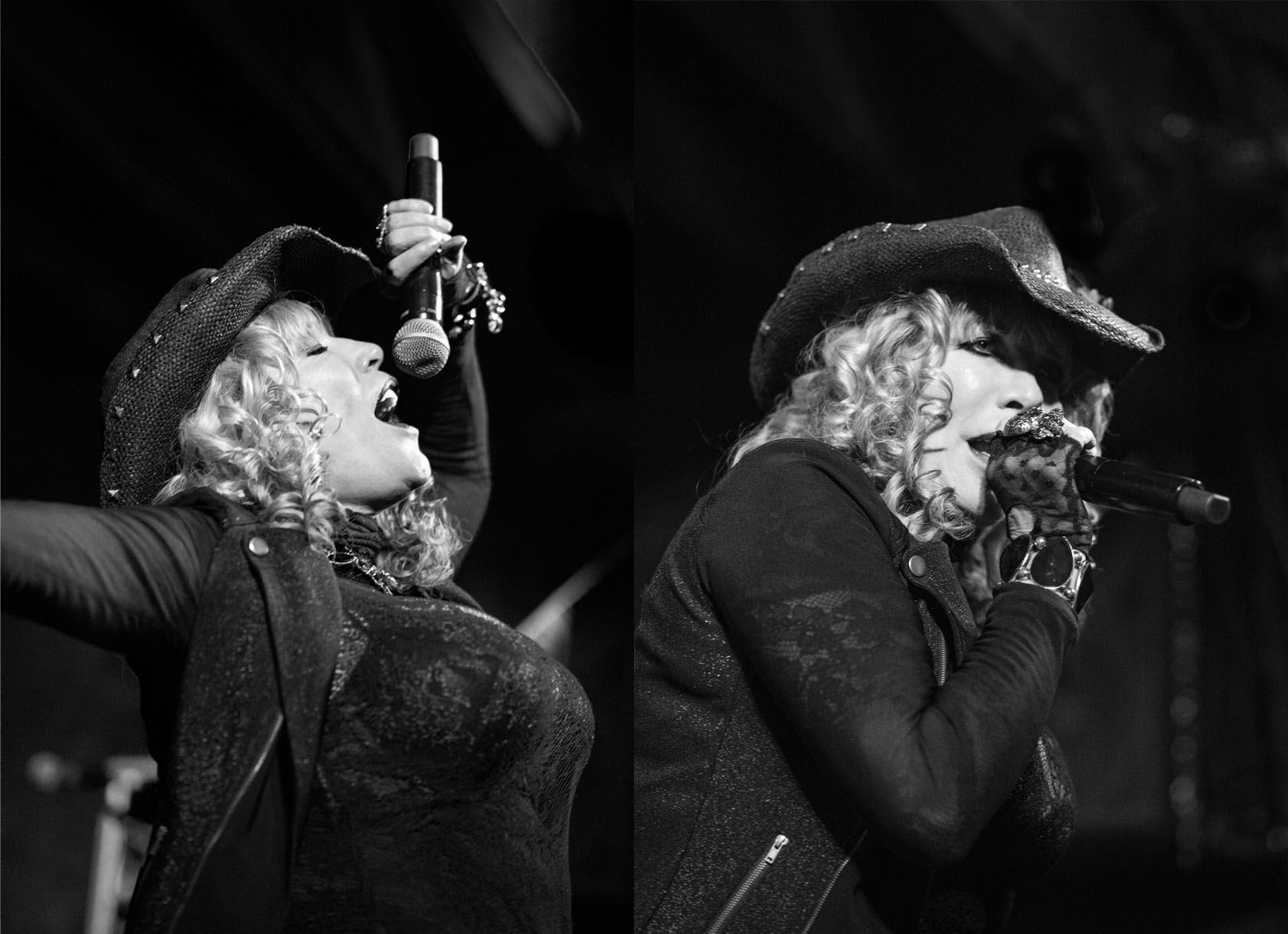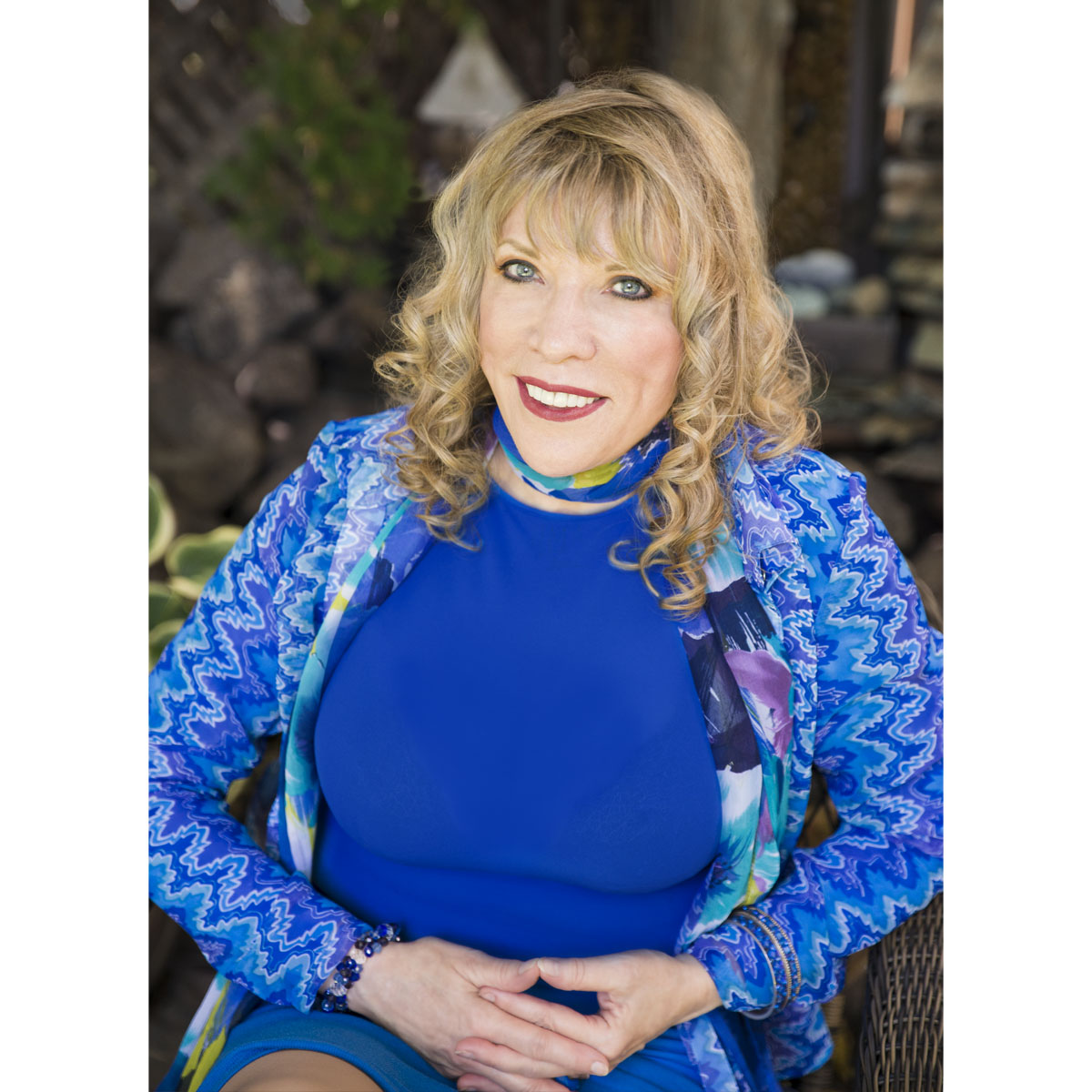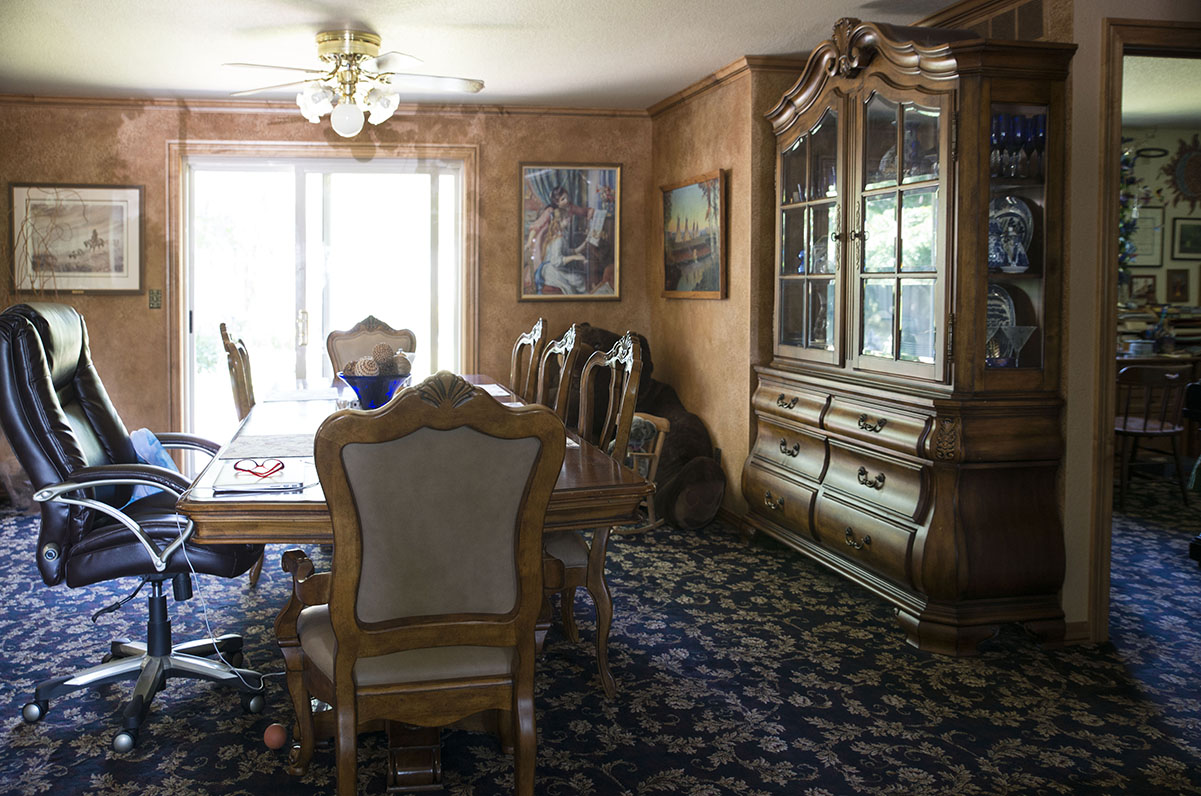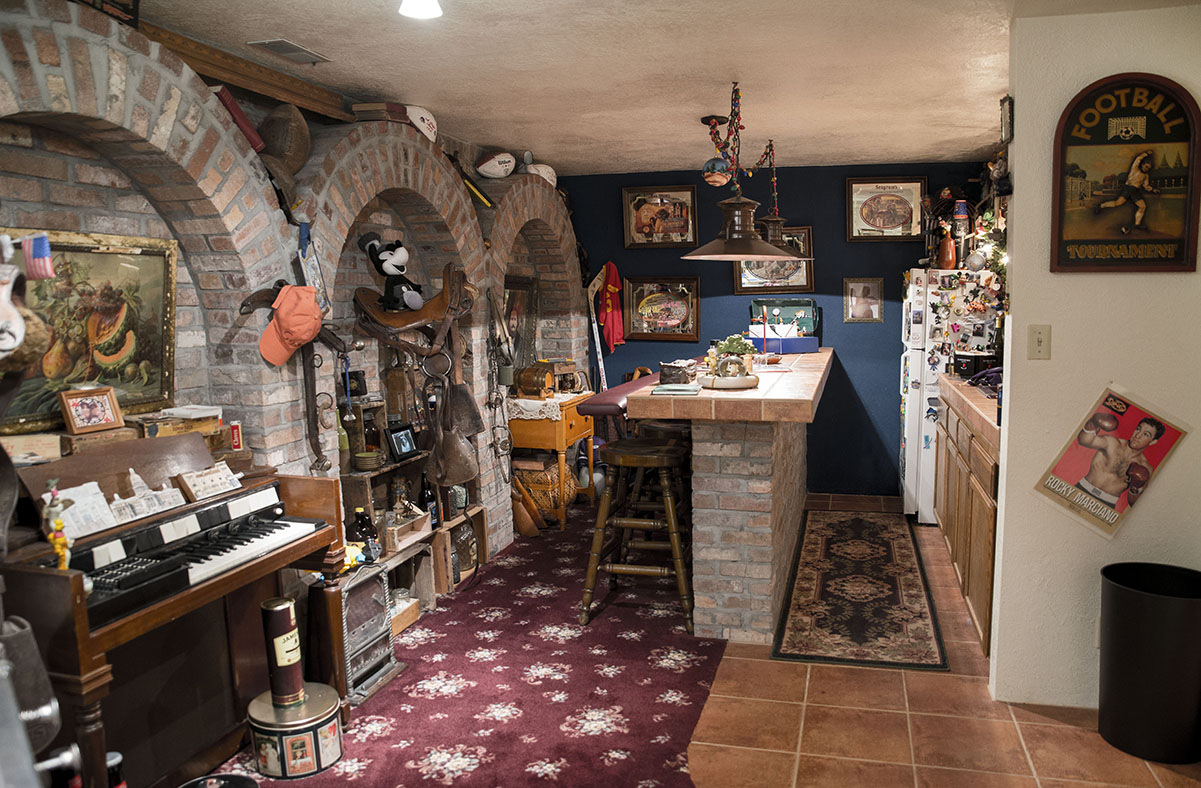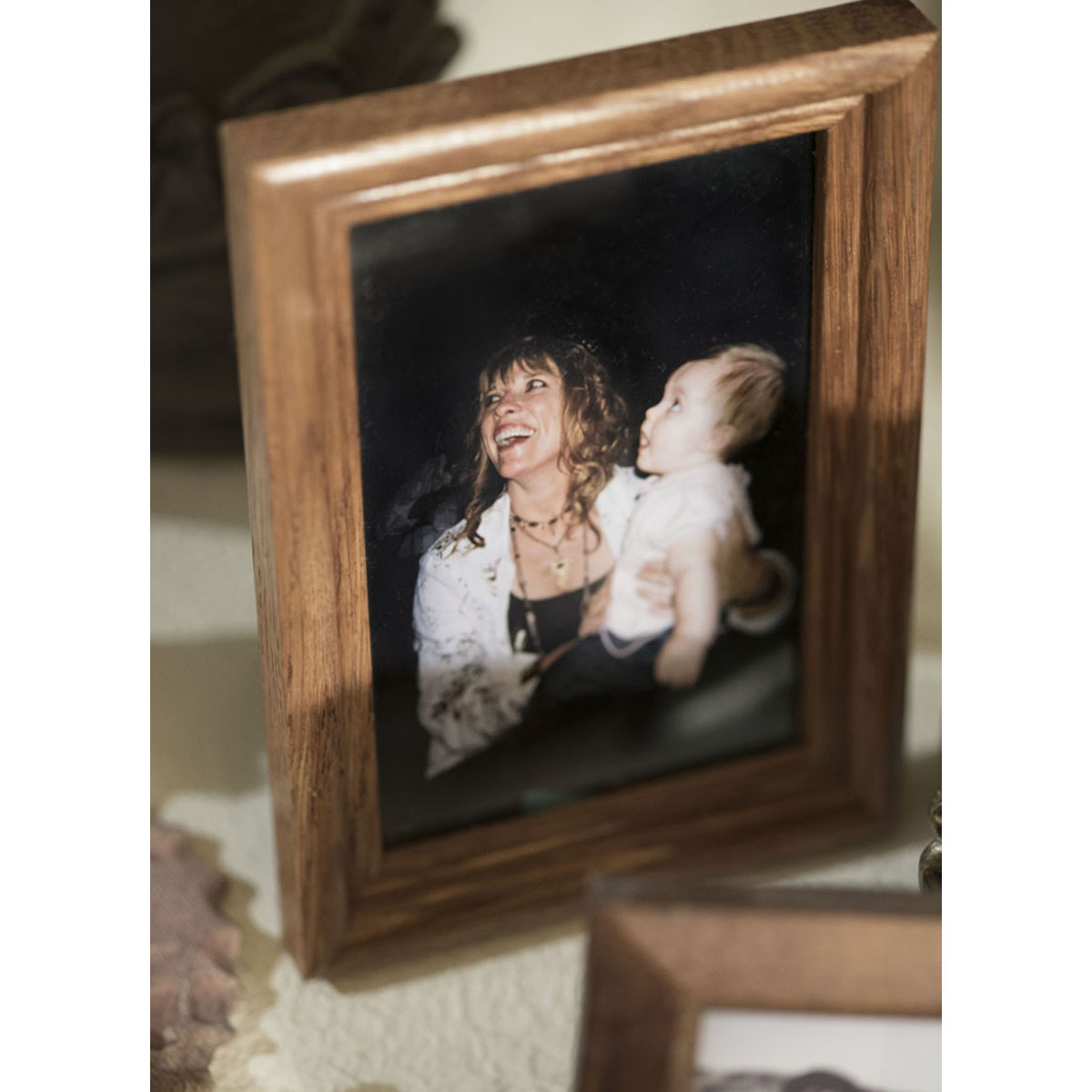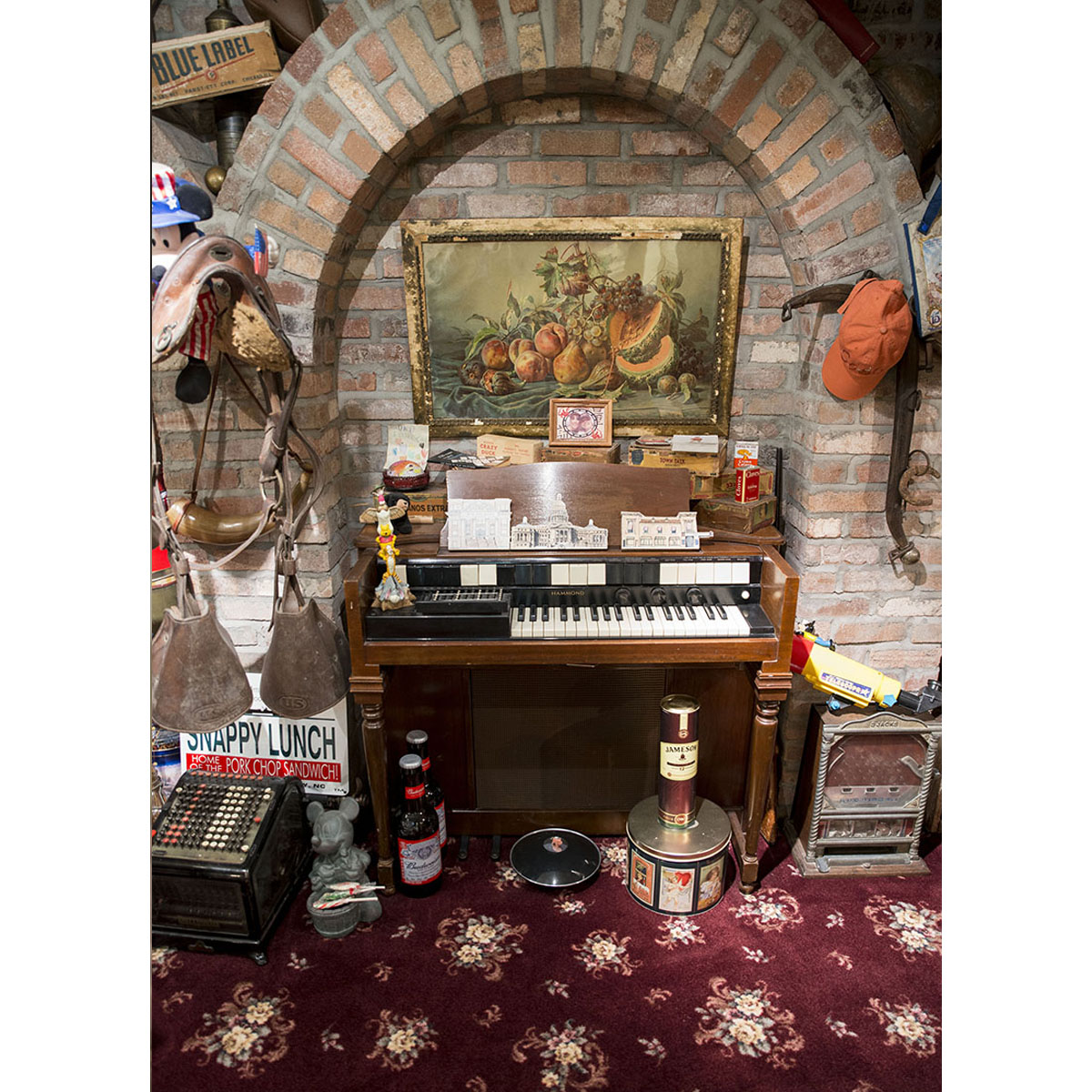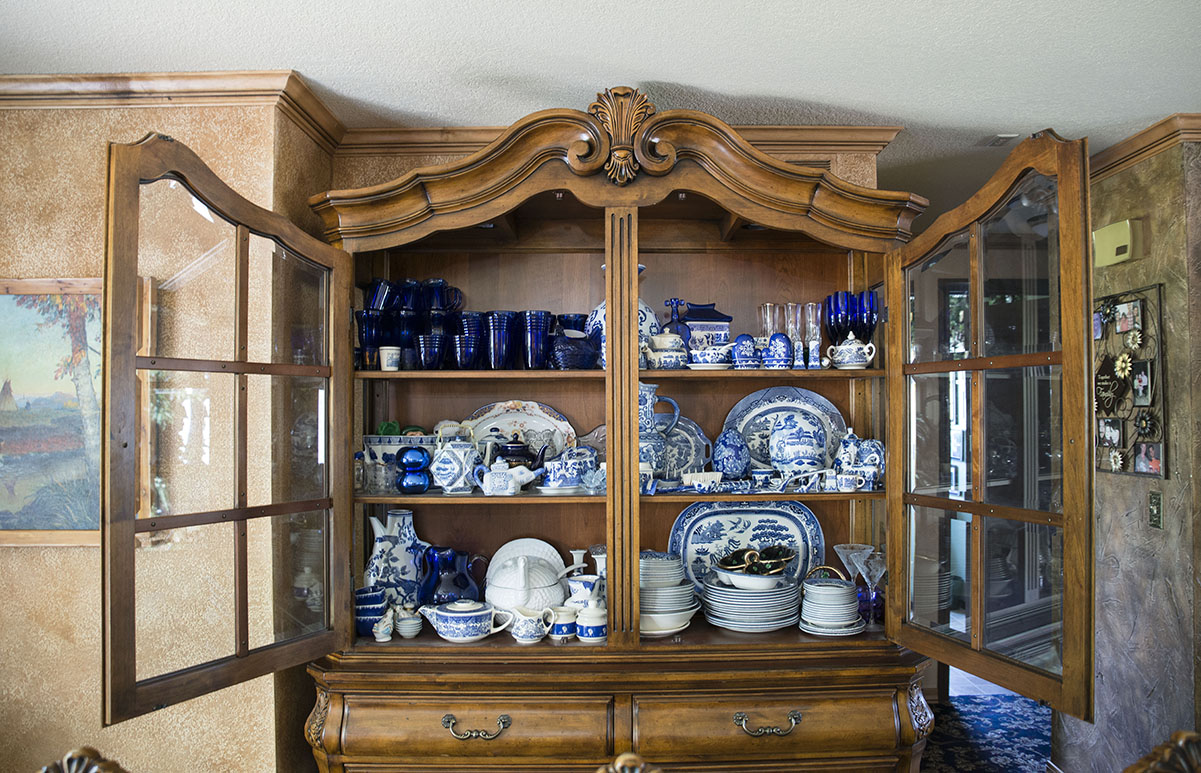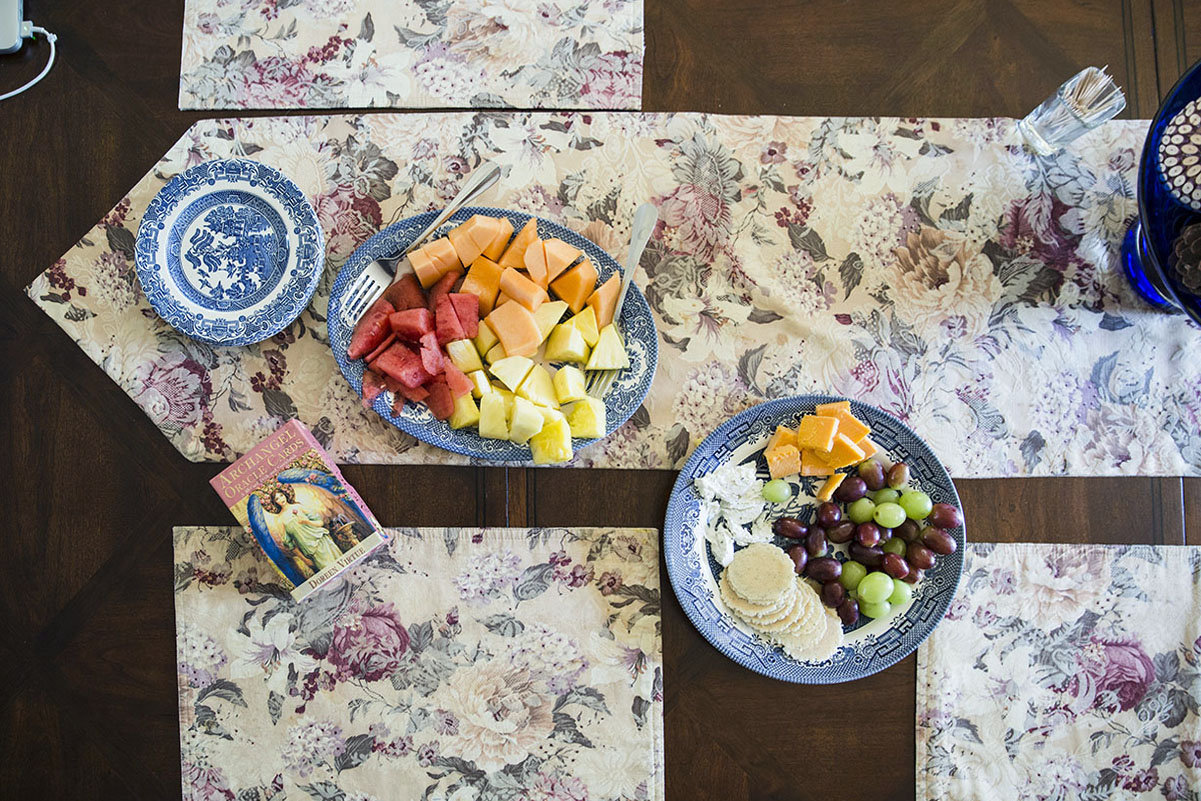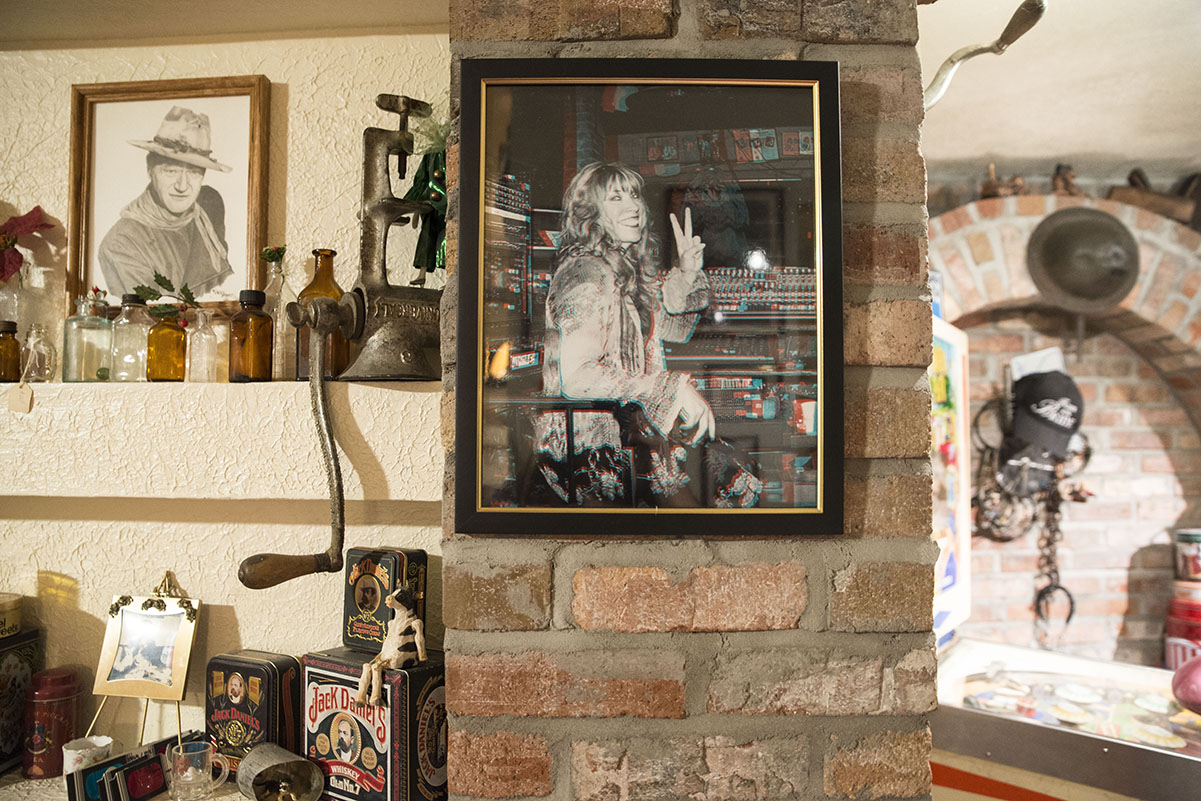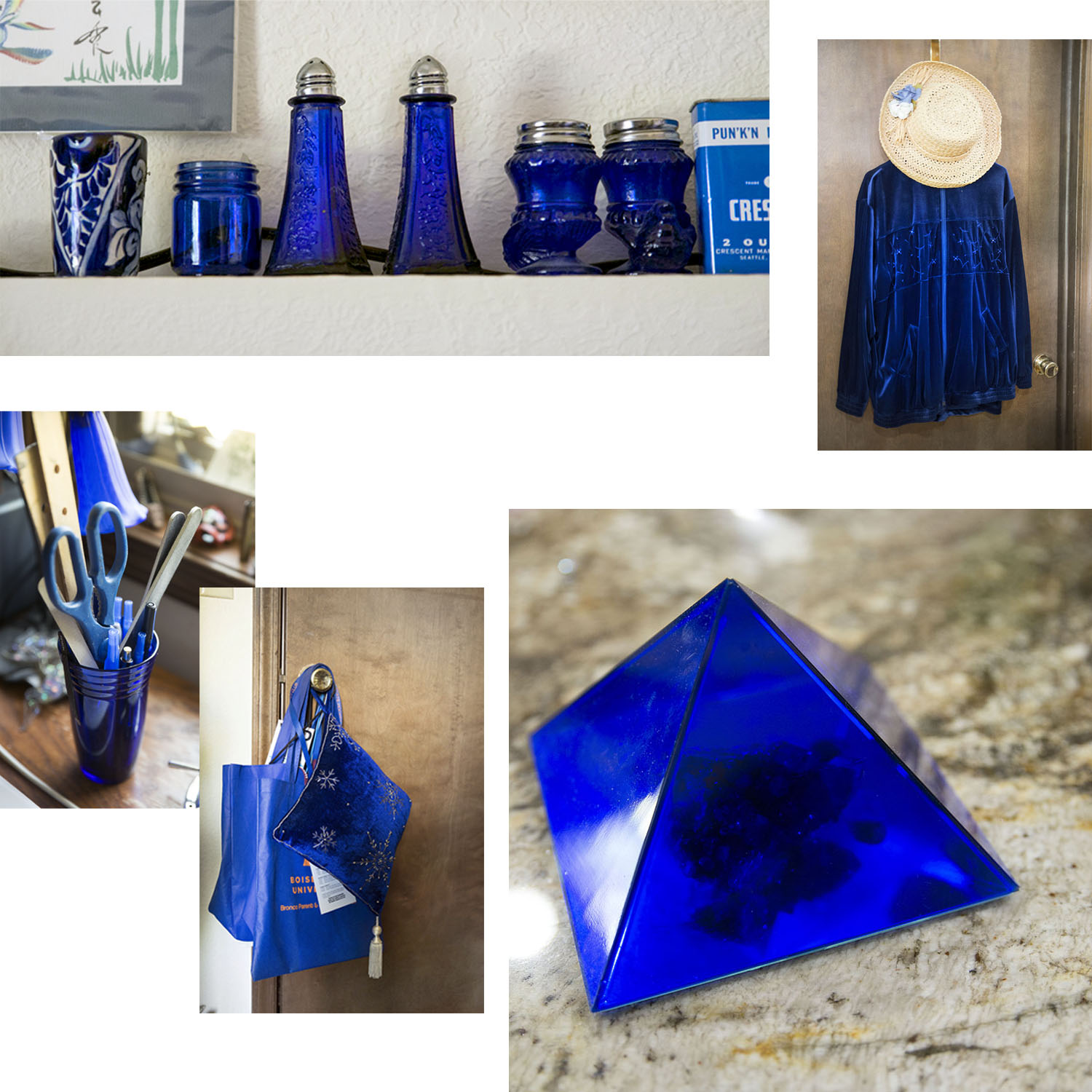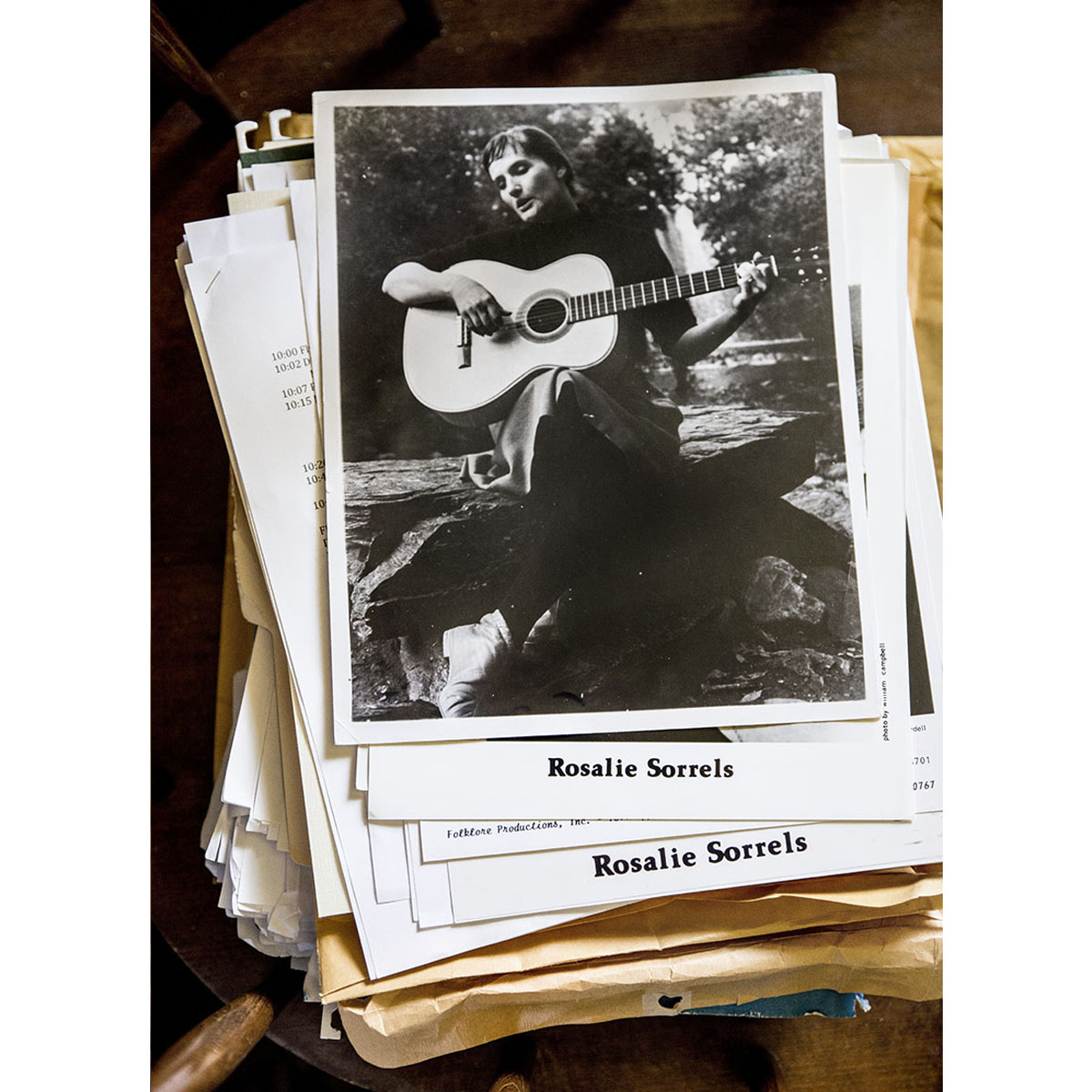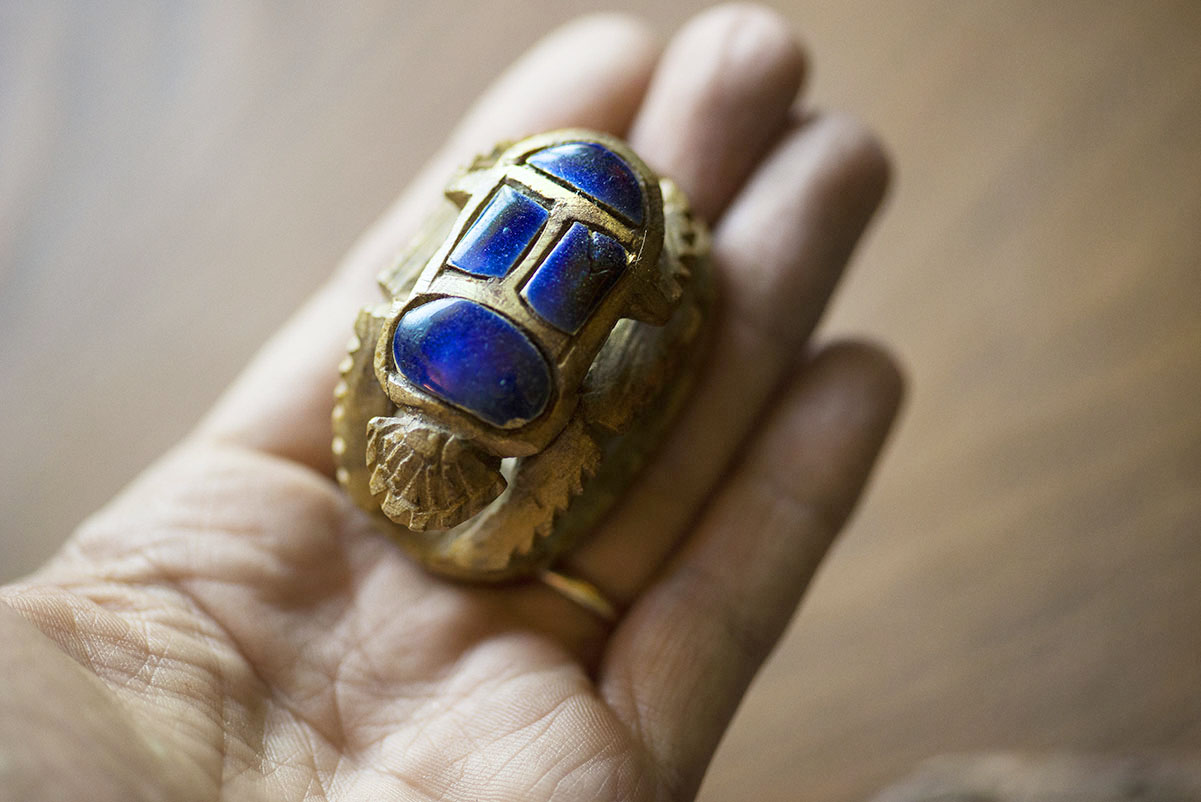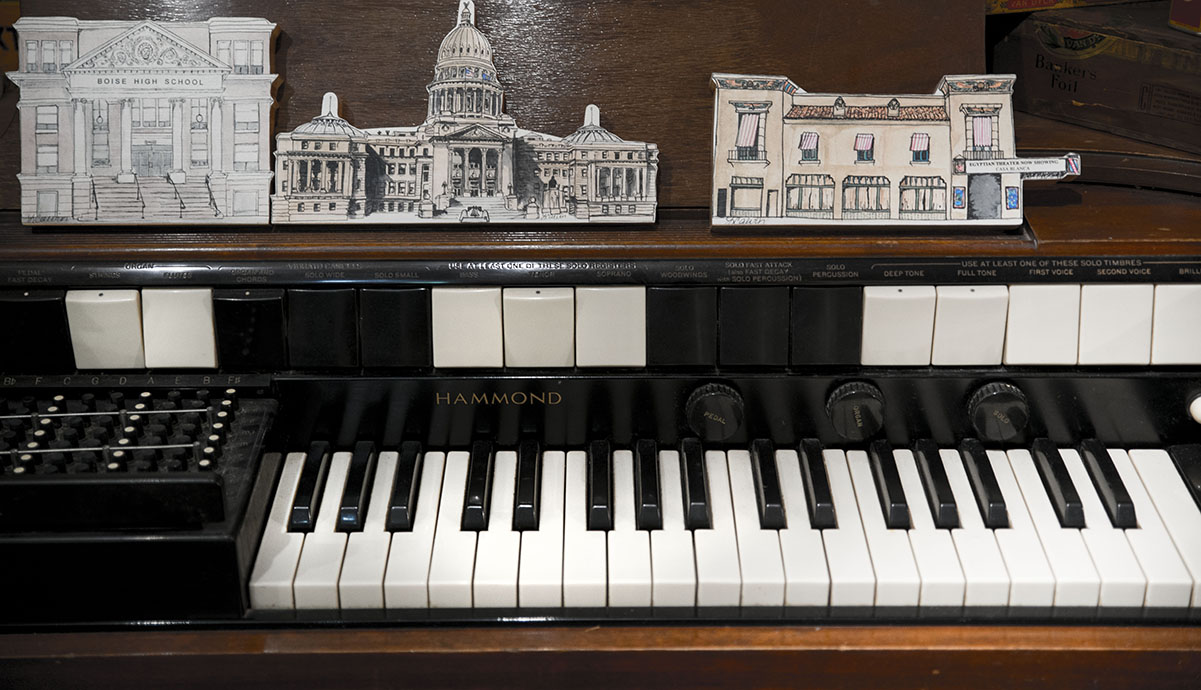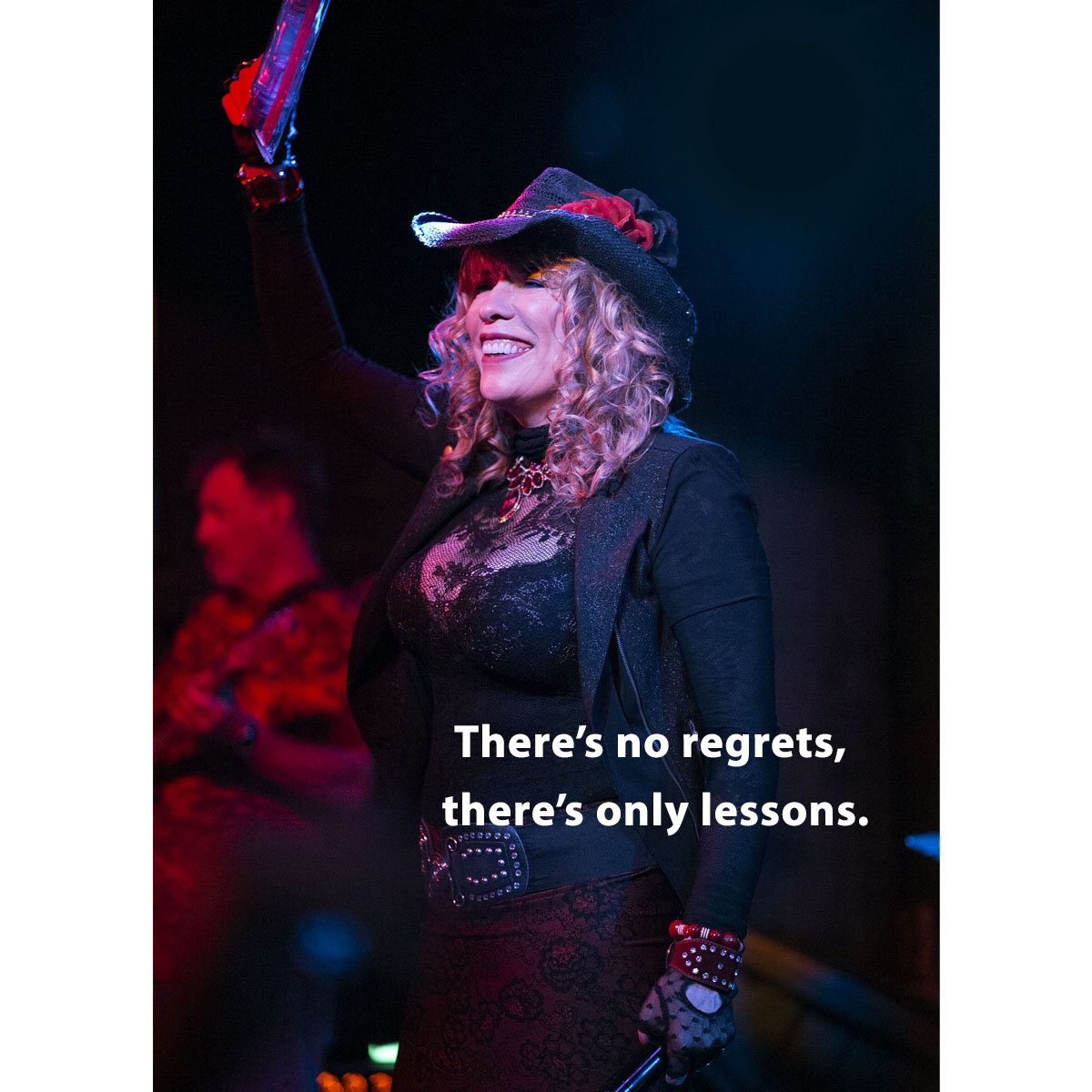Creators, Makers, and Doers: Rocci Johnson
Posted on 9/13/17 by Brooke Burton

Interview & Photography by Brooke Burton ©Boise City Department of Arts & History
Rocci Johnson is best known for her vibrant, fun performances at Humpin’ Hannah’s in downtown Boise that range from pop and rock & roll to vaudeville and burlesque. The Saturday night crowd might not know that she continuously supports the arts, veterans, victims of domestic abuse, and LGBT rights, among so many others. She is a leader, an organizer of events and people towards charitable goals, something deeply driven by her own experiences. Off stage, Rocci is a powerhouse of acceptance and positive energy, and she’s been bringing it for 29 years.
You are receiving the Mayor’s Award for Support of the Arts and you’ve just completed a tribute album and concert dedicated to Rosalie Sorrels that brought together more than 30 musical artists. And, for instance, when I call you about an interview, the Idaho Botanical Garden is calling you too about your garden— we both want to come on the same day and take photos and talk to you. Your schedule is non-stop and you said, “This is normal.”
I’m usually busy. In fact, today, when I leave here, I’m going to go help my niece co-sign for a car, then go meet with the Boise State hockey because I’m president of the Boise State hockey boosters. I’m meeting with the team so that will be about a three-hour meeting. And then we have a son who’s visiting from Orlando, yeah, that’s a typical day.
And you top it off most nights with a high energy performance on stage at Hannah’s until the wee hours. Okay, do you ever sleep?
I sleep about five hours a night, probably. I do a power nap right before work, about twenty minutes.
I’m feeling a little star struck because I got to watch you perform last weekend, and I’m in awe of your professionalism and your confidence, and your successful career. You are very accomplished. You grew up in Montana, a lot of little girls fantasize about growing up to be a musical artist. Did you ever dream that this would be your life?
Oh, yeah. That’s all I was ever going to be.
Really? There was no, “I want to be a doctor or a schoolteacher?”
No—I was always, always going to be a singer, but I have a very scientific mind, so it’s kind of this weird dichotomy; I started college at sixteen. I adore science, I have subscriptions to Astronomy and Scientific American and all kinds of weird things that you’d never think a chick singer would have. [Laughs]
No, I did not come here thinking you were going to say that.
I’m really into quantum physics, and I find a lot of confirmation of my spirituality at that level. That type of thing is just fascinating and I drink it up because I think it’s more confirmation of the beauty of this planet and the beauty of creation.
How did you come to be at Hannah’s? And marry the co-owner!?
Well, there’s a really funny story with that [laughs.] I moved to Boise from Montana in the middle of winter with a guitar player. You can’t make a full-time living in the music business in Montana. I had to make a new start because of my past with my ex; at the time our guitar player’s band had developed quite a following in Boise, so we decided to put a new band together. We moved with my children for the house job at Hannah’s. I trusted [him] to hire the right people and he hired a drummer who was really, really alcoholic and he hired a bass player who hadn’t been on stage for years. We’d had just a few short rehearsals—
Oh, boy.
We played Wednesday and Thursday and it was just really hairy and not good— then Friday our drummer showed up and it was his wife’s birthday and he was drunk as a skunk. He couldn’t even hardly stand up.
Oh, no.
This was our first week.
This is what nightmares are made of.
Yeah. We got done with the set and it was just awful. At the time I didn’t know Dick other than being the owner, and he’s a former Marine, Vietnam, recon, hard-core, so he runs our establishment very much like a Marine sergeant. He came up to us at the end of the night and said, “Here’s your paycheck for the whole week. You guys are fired.” [Laughs]
[Laughs] You played all of three nights?
We got fired, totally fired. They played cassette tapes the next night instead of having a band. That’s how bad we were. I had to admit, we deserved to be fired. Years later, when [Dick and I] started dating, I really liked him a lot, he said that he started falling for me. After we were married, he told me that he thought that I was getting him to fall for me so I could drop him like a hot potato to get even with him, for firing me years before. [laughs]
He had a fear, deep down, that you were going to dump him for revenge?
I’m like, “How could you fall for somebody you’d think was that evil, that I was getting you to fall for me just so I could be mean and flick you off?” He’s like, “I didn’t care. I just really liked you.”
He just really liked you!
The bigger part of that story is that we [re]hired two people that were in the previous band and we did great, and Dick and our partner Todd came and listened to us and they said, “Okay, you guys, how’d you put it back together so fast?” Within a month we got our job back, but it took another year, probably, for us to get the actual house job.
You are awesome on stage.
[Laughs]
You have an amazing stage presence. How close is that to the real Rocci? Stage Rocci versus Real Rocci?
Oh, God, I don’t know. They intersect so much.
Really? You have a sense of humor up there. That’s apparent.
Oh, I have to—you have to have a sense of humor in life or you can’t get through it. Although my band mates will tell you that I am a hard-driving boss. I believe in a certain level of excellence because we have a service to perform. A lot of people depend on us to make their living—we have over fifty employees in Hannah’s and many of them are students or single moms and they depend on this income. I’m not by any means a slave driver and I pay my band mates really well—I make sure that their working conditions are as excellent as possible. We run a very clean establishment, we have great staff; love our staff at Hannah’s.
There’s good people down there.
We’re like a family. We actually hang out on our days off and have barbecues and go to the lake. We have an orphan Thanksgiving and everybody that doesn’t have a place to go comes over here.
You said you left Montana because you needed a fresh start, why?
I [grew] up in an abusive household and then I married someone very much like my father—I was seventeen when I met him and, I was going to college, so I knew everything.
No one could tell you anything?
No. No. He was thirty-two. He was Special Forces Vietnam, again, two tours, a Green Beret, graduated first in his class in the nation in Special Forces. And that’s one of the reasons that I was drawn to him because he was hugely intelligent. Most of the boys I was going to college with were, oh, my God, they were, you know, jocks and whatever. But, to get home from Vietnam, [my husband had] hijacked a helicopter and kidnapped his lieutenant colonel. [Laughs] This is the man I was married to for fourteen years. I was Catholic and I stood before God and said that I would be married to this man for the rest of my life, so, even though it was a very abusive relationship and very violent, I had sworn a vow. So, I stuck with it.
But you did get out eventually. How did you get from the commitment you’d made in your heart to realizing it was okay to walk away?
There was a moment, and I can tell you it was exactly as Marlon Brando described it in “Apocalypse Now”—where this [diamond] light pierced his skull, it was exactly like that, I cannot stress any more strongly what that was like. [My husband had] been on a three-day bender, he’d taken the family paycheck and gone out and spent it on drugs and alcohol and been gone for three days and when he got home he had this almost demonic look in his eyes that a really violent person or someone who’s been on drugs can get. I had my girls and I went and hid in the closet and we were terrified that he’d find us, and that’s when it literally pierced my skull with this light and I heard the words, “You made a vow, but these children did not.”
The chills. Oh, my God.
And I knew I was released. I was told, “You have to leave or you will die and the children will die.” My mother is very psychic and so as soon as I got out of there and got safe, I called my mother and [told her what happened], she was very aware of what I had suffered through and the children. She said, “Well, let me go meditate on it and I’ll be right back.” She went and prayed and called me and said, “You have to stay.” “Mother,” I said, “I can’t. I cannot. I know with every ounce of my being that I am released of my vow.” And she said, “I don’t know what it is, Rocci, but you need to stay.” I trusted my mother implicitly. She had suffered greatly, having been married to my father, but, more than anything, we shared that spiritual bond, so I stayed. Within a month he’d been fired from the last job in our hometown and nobody else would hire him, so he went out to the docks in Seattle and was working out there for several months when he called to wish me a happy anniversary I couldn’t say it back to him. He said, “You want a divorce, don’t you?” And I said, “Yes.” And he said, “I understand.” After that, he hung up the phone and I didn’t hear from him for a while. Well, I didn’t know [the rest of the story] until years later—when he was doing one of his twelve-step things. He came to visit and said, “I’ve got to tell you what happened when I got off the phone with you. I hung up the phone and I walked off the job and I went to the nearest liquor store.” He said that he had gotten in the car and his intention was to drive from Seattle to Billings and kill me and kill the kids and kill himself.
Oh, God.
He said, “You always wondered what happened to your car, didn’t you?” because I never did get my car back, he said, “I ran out of liquor on the road, so I pulled into a bar and I got into a fight and while I was in the middle of the fight the car was stolen, so I walked out and I didn’t have any place to go and then I got arrested [for the fight],” While in jail he tried to kill himself so they committed him [to a hospital.] Then apparently he tried again, so they committed him for six months.
You didn’t hear anything for six months?
Yes. So, that was why my mother had that [intuition] because if he hadn’t been that far away and the car hadn’t been stolen— I really believe in spiritual intervention. I believe that we were saved. I believe that we’d be dead [if not for my mother.] That’s another reason I’m really committed to veterans’ issues—I believe that my husband was programmed to be a killer and [while] I very much believe in the military, there was still this shadow cast over PTSD, it was terrible; you didn’t speak about it at all.
Veterans were expected to come back and just get on with life?
Yes. He was part of the contingents that burned villages and things and that’s when he wanted out and that’s when he went crazy and hijacked a helicopter. He said, “This is wrong. I can’t”—he joined Special Forces because he believed in America and he wanted to make a difference and he believed in the mission. Then he gets over there and he’s in the jungle sitting in Cambodia when Richard Nixon said on the radio, “We don’t have troops in Cambodia.” And here he was in the jungle with his fellow soldiers. Those kinds of things really screwed him up and screw up many of our military personnel and their families. I do believe in a strong military and I believe in supporting our military, but being the spiritual person that I am, I think it’s got to be a bigger picture. We can’t go in and be the big guys all the time. Jim [my ex-husband] admitted to me that he fantasized about “going out in a blaze of glory.” It’s that type of thing, where, “You’re mine, you’re my wife and you’re my kids and nobody else is ever going to have you, and if I can’t have you, nobody can.”
Did he end up going out in a blaze?
He did. [Years later.] He finally checked out of a hospital, a Veterans hospital, and checked into a hotel. He finally wound up taking his own life. It was really hard on my kids. That’s another reason I work with Suicide Prevention as well. It’s really, really terrible, Brooke. I don’t know if you know that Boise’s got a real problem. Here, happy, sweet little Boise. I mean, you’d think— We have such a great community, I work a lot with the Boise Police Department, I believe in supporting law enforcement and I see these guys in the front lines all the time—men and women who are in uniform who are dealing with the same circle of mental illness that’s not addressed in our society, and law enforcement winds up having to deal with these people when they just haven’t gotten the care that they need. I believe that Obamacare has been great on the mental health front because there’s a lot of people getting help that wouldn’t have gotten it, and it’s helped veterans. I know there’s issues with Obamacare. I know it needs to be fixed. But it has made great strides in the mental health arena.
What are the problems you’re seeing?
It’s really a broad thing; it’s with our youth; I think there’s a disconnect with spirituality. There’s not a sense of community and there’s not a sense of a common goal within that community. It lends itself to a lack of moral compass and a lack of an end to, like, why am I here? You know, all the great questions of our existence. There’s no cohesive answer for our young. Also, I really believe that they’re lost in their cell phones, they’re lost in this unreal world that’s augmented by reality television, which is the furthest thing from reality that there is. They see crisis and drama and all these things [on tv] that are supposedly—
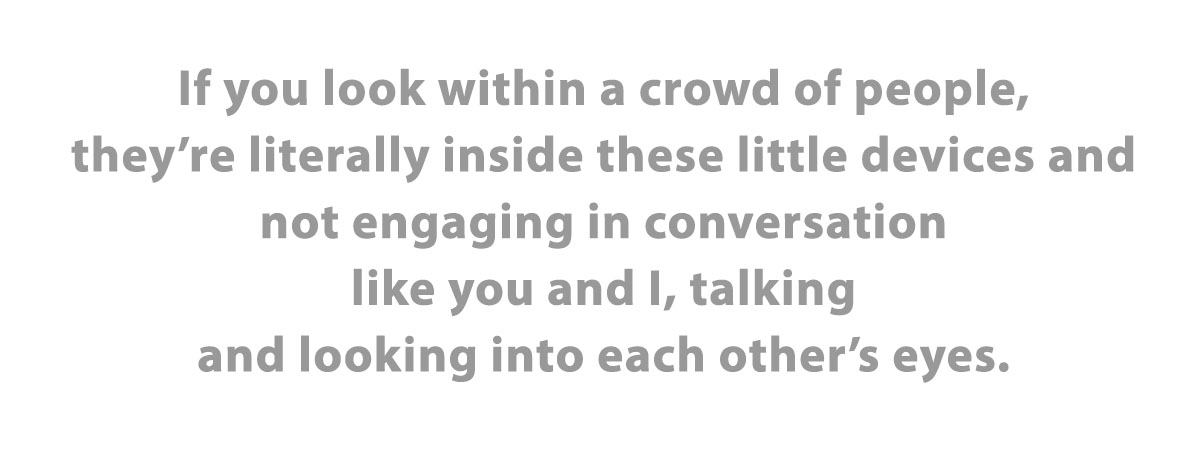
Normal?
Making people stars and [portrayed as normalcy] when nothing is further from the truth—to live your life in crisis and drama on a constant basis is no way to live. When they don’t get that kind of adulation and that attention there’s this sense of hopelessness and lack of fulfillment. I think our education system really needs to be looked at, too. I know a lot of teachers who are just floundering. They’re really struggling because we’re not supporting our education system. [People] have no idea what it’s like to teach now; between the parents and the lawsuits and the parameters. Then they’re taking away things that keep the kids happy and composed, like the physical education and music programs.
Taking away art?
The art and those things that give a well-rounded education. I think those factors combined are escalating the suicide rate. If you look within a crowd of people, they’re literally inside these little devices and not engaging in conversation like you and I talking to each other and looking in each other’s eyes. There’s something about that device that hijacks the message and keeps them from actually seeing an emotional reaction in someone’s eyes or in their face or a smile. Get out of your phones and get out of your computers.
How would you model that?
I think that parents need to set device-free times, and I think it’s hugely important for families to just say, you know, it’s time to put the devices down.
I feel like throwing my phone away right now! You’ve inspired me.
[Laughs] Well, we’re all connected to them—business-wise, obviously I depend on social media, I depend on my computer, I depend on the connection of the phone, and they’re hugely convenient. But as human beings, we can’t be lost in machines. We are programmed to be interacting with each other.
There’s a drive for emotional intimacy, and if you are unable to get it you fall into despair?
Exactly. And lose that connection.
It’s a sad reality. Tell me about your spirituality.
I’m a big meditator. That’s the first thing I do in the mornings.
Every day?
Oh, every day.
How long do you meditate?
It depends, because I do a lot of work. I bring in a lot to the planet. And then I also put it out to the people, you know, who are my soul group, my family. It just depends on what’s going on and how heavy the energy is, which lately has been pretty heavy. I haven’t felt it this heavy for a long time.
When you say you feel that heaviness when you’re meditating, how would you describe that?
When I’m meditating, I go out as far as I can into the divine and pull that divine love into me. And then I pour it out into the earth. And sometimes it’s really hard to push through to feel that divine unconditional love; if I can’t get through, it’s almost a physical thing.
Hmmm. An oppression? Have you ever had that dream where you’re trying to move, or run, or wake up and you can’t? Is it like that?
Yes, it’s like that. It’s very similar to that.
That’s curious, I should meditate.
Especially now, because there’s a lot of fear and uncertainty. I feel people who, because of that fear and uncertainty, are clinging to old ways of doing things or they’re thinking that the old ways are better than evolving.
Resisting? Out of fear?
Yes. I try not to judge that, because everybody has a right to their opinion, but I think there’s a lot of disturbing reactions out there right now, Charlottesville was a prime example of that.
Yes.
And I do think that much of what’s going on is fear- and anxiety-based. And there are people that are hijacking all of those things for their own ends— I see that in our government and in places of power everywhere, like the Church. I really, truly believe that each person has their own individual spirituality and there’s no way that two people can have the same spirituality. It’s great to have community, but [it’s not possible] to have a certain set of beliefs that will apply to everybody. And I think anytime you try to insert that or inject that or overtly, you know—
Pigeonhole people.
—it’s just not going to work.
Why do we do that? Why do we try to make everybody fit into a mold?
Well, I think part of it is power and control. I’m really broadly based as far as my spirituality. I believe lots of very highly spiritual people have come to the planet to try and help. So that’s my mission—a lot of times the work is done behind the scenes but yet [laughs], to be perfectly honest, it’s a lot of what I do at the dance floor.
Oh, yeah?
It’s an energy thing.
Uplifting?
I’m bringing in that same energy that’s light and—
Joyful.
And sending that unconditional divine love out.
Wow. That puts a smile on my face, you put a smile on my face! Are you a visionary? Looking at these things you’ve founded: Teddy Bears for Tots, the hockey scholarship, EarthFest, supporting Pride Week, supporting Women’s and Children’s Alliance, and the list goes on. You have a natural tendency to be a leader, would you describe yourself that way?
I think that it’s incumbent upon us to use the talents we’ve got to make this planet [better.] I learned a lesson from my mother when I was really little. I was five. They were doing a little fundraiser at church for kids at Christmas. I had saved up my allowance and all I had was a dollar. I said, “But, Mom, all I can do is donate this dollar. That’s all I’ve got.” And she said, “Rocci, if” [voice cracks] I miss my mom. I lost her—about a year ago. I still miss her a lot. She said, “If everybody gave a dollar, then the problem would be fixed, wouldn’t it? So, you just give your dollar or you give whatever you have whenever you can and know that you’ve done what you can do. If everybody would do that, all the problems of the world would be fixed.” And I apply that to every single day, because— again, back to the suicide thing, back to the despair and the lack of connection to people—if you smile at that person in the checkout line, that might be the thing that saves their life, you know. Or, you say, “How’s your day going?” you might make a difference in that person’s life. I have the capacity to talk the talk and walk the walk, so it’s incumbent upon me to do that.
Not everybody has that. But you’re definitely walking out in front.
Yeah. Somebody’s got to do it.
Well, what about regrets?
No. I really embrace that there’s no regrets; there’s only lessons. All you can do is take something that you perceive as a mistake and apply it in a way that’s going to either make you a better person or make the others around you better. Because we’re humans and we’re capable of error and that’s how we’re built.
Lessons—not regrets?
Yes.
Well, the last thing, if I handed you a crystal ball that showed you five or ten years in the future, what are you hoping to see?
Oh, gosh, I don’t even know—I think about that a lot. Because I don’t see myself as retiring any time soon, but yet, the age factor—one of these days has got to come in. I’m going to keep performing at the level I do for as long as I can, because it helps with my social causes. Being a performer and an entertainer helps me get things going in the community.
You’re doing good work.
[Laughs] Yeah.
South Boise
September 13, 2017
Creators, Makers, & Doers highlights the lives and work of Boise artists and creative individuals. Selected profiles focus on individuals whose work has been supported by the Boise City Dept. of Arts & History.
